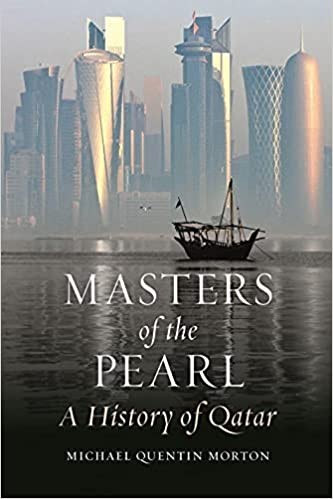From the many historical books of Qatar, one of the newest is "Masters of the Pearl: A History of Qatar" (2020) by Michael Quentin Morton. The author has written a history of the UAE, oil in the Middle East, Buraimi, his father's life as an oil geologist, and this book on Qatar (where he spent time as a child). Overall, this is a detailed history that is well structured and well written. The author is not an academic and this book is not published by an academic press (publisher: Reaktion Books), most of my issues with this book are because I am reading this book as an academic with an interest in the sources. However, even as a book for the general audience, as a historical work, it seems consistently referencing sources is good practice.
References: The book does list references and has footnotes, but inconsistently. Many historical details are unreferenced, leaving readers guessing the source of information (trying to look back to the last reference or another nearby footnote). This is missing when evidence is directly referred to, for example: "archeological evidence" (p. 61) and "there is evidence..." (p. 61), which don't have references. Or, there are mysterious sources, such as "one Khalifa historian" (p. 22), "one source" (p. 23), and "from the oral tradition" (p. 24), also without references. This makes an interesting book less useful (for those of us wanting to read the original sources).
Colonial terminology: The author unquestionably uses terminology such as "tribal" and "tribes" as well as "pirates" to describe the people of Qatar (apparently the author disagrees with or has not come across alternative, non-colonial perspectives, such as Sultan Muhammad Al-Qasimi's 1986 book "The Myth of Arab Piracy in the Gulf"). In part, this may be because the author is not a historian by training (a lawyer by profession), where the contextualization and problematization of historical sources would have been a topic of consideration. This relates to the broader framing of the entire book, discussed next.
Colonial lens: The book does not use Arabic sources (or alternatives, such as Turkish or Farsi), and relies heavily on the British colonial record, and thereby privileges the colonial gaze in the telling of history. Western sources are the main reference points (be that maps, names, sources, etc), creating a Eurocentric frame around which history is told. The colonial record is replete with bias (what is included and what is excluded, whose voice is heard and whose is silenced, et cetera). The author does not grapple with this, and largely adopts the colonial gaze as the true and accurate representation of history. This approach is taken even when alternative perspectives do exist, in English, such as Al-Qasimi's book noted above. Amongst the missing books and references is one of the strongest academic books of recent, written by Kamrava in 2013.

